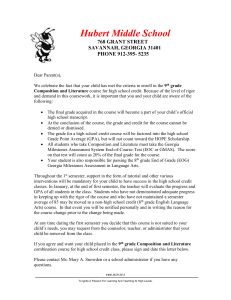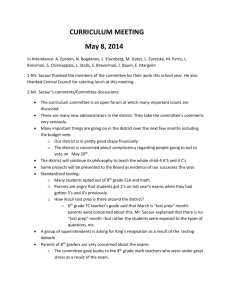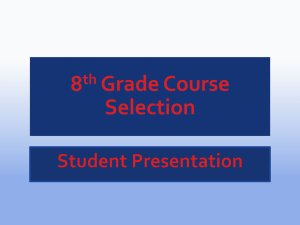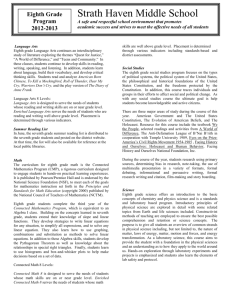Logic Course Catalog_2015-16-1
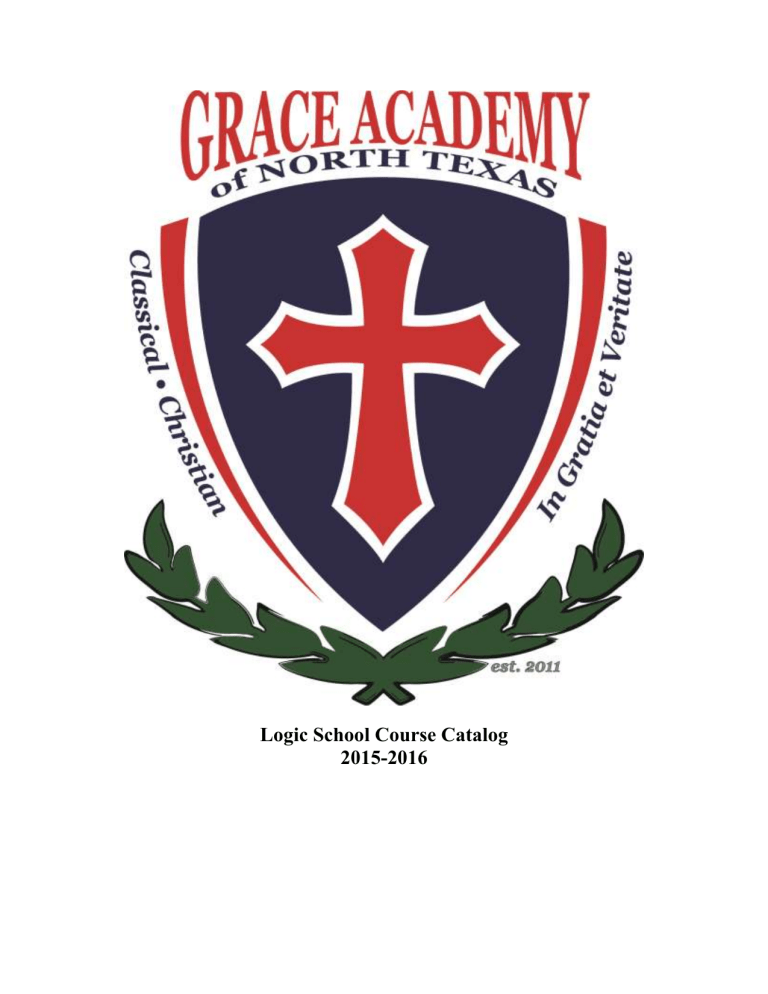
Logic School Course Catalog
2015-2016
COURSE DESCRIPTIONS 1
THEOLOGY
6th: Bible Essentials
This course begins with an introduction to the Bible, its origin, and why we believe it is
Truth. Students are taught that salvation is by faith alone and how that faith impacts our daily lives and the works we produce. This includes an understanding of the term worldview , what it means to have a biblical worldview, and the character traits of Christ that it will reinforce in one’s life. Students learn, by instruction and practice, how to read the Bible knowledgeably, interpret it accurately, and apply it appropriately.
7th: Old Testament Survey
In this course students review the historical books, the books of wisdom, and the prophets. Profiles of main characters and Old Testament themes are assessed, particularly as they prepare the way for the coming of Christ. Themes include: Creation, The Fall of
Man, The Establishment of God’s Redemptive Plan, The Sovereignty of God in the
Nation of Israel and the World, God’s Covenants to Man and to Israel, Interpretation of
Life, the Good Hand of God, and God’s Promise of Redemption.
8th: New Testament Survey
In this course students read a large portion of the New Testament while studying the themes, history, chronology, literary techniques, and context of each of the 29 letters it contains. Major themes include: Canonization, Christology, and Eschatology. The course also introduces students to logical fallacies, helping them to properly discern truth claims and evaluate arguments.
ENGLISH
6th
This course builds on reading and writing fundamentals learned in Grammar School through the exploration and analysis of different literary genres. Grammar and vocabulary study are integrated throughout the course as students practice writing narrative summaries; reference reports; and descriptive, expository, narrative, comparative, and issue essays. Several selected works correspond to the time period studied in the sixth grade history course. Independent reading is also required.
7th
In this course students continue to engage with a range of literary works to further their analytical reading and writing abilities, with emphasis placed on identifying and evaluating literary themes. Students find and synthesize information from multiple
1 Grace Academy of North Texas reserves the right to withdraw a course offering due to insufficient enrollment or unexpected staff changes.
2
sources to create more advanced compositions. Several selected works correspond to the time period studied in the seventh grade history course. Independent reading is also required.
8th
This course aims to ensure that students are prepared for the advanced requirements of
Rhetoric School reading and composition. Students continue to practice writing in various genres, with special attention given to the editing and revision process. Several selected works correspond to the eighth grade U.S. history course, and the student trip to
Washington DC provides the basis for a central assignment. Independent reading is also required.
HISTORY
6th-7th: Medieval History 2
This course explores significant historical events occurring between 200 and 1700 AD, emphasizing the Middle Ages, Renaissance, Reformation, and Scientific Revolution.
Students develop fundamental skills of historical analysis, such as identifying main ideas, recognizing causal relationships, classifying primary and secondary sources, and distinguishing between fact and opinion. These skills are applied through various writing assignments and class discussions.
Seventh grade students will study the same historical time period, but assignments will be differentiated. For example, seventh grade students should expect additional primary source reading, external research, and written evaluation.
8th: US History from 1877 to the Present
This course explores significant events, people, and ideas in American history following the Civil War. Students will engage with primary source materials in every unit, learning the importance of contextualization, corroboration, and close reading for historical analysis. They will conduct their own historical research and formulate conclusions about historical events and their significance in today’s world. In the fall semester, students will also travel to Washington DC for a week of experiential learning in the nation’s capital.
MATHEMATICS
6th: Intermediate Math 1
In this course students acquire fundamental problem-solving skills. Topics include: data and graphs, patterns and variables, number theory and fractions, ratios, proportions, percents, and tools of geometry and measurement. Probabilities, integers, equations, and inequalities are also introduced.
2 Future seventh grade classes will take US History to 1877.
3
6th-7th: Intermediate Math 2
This course builds on learned principles to enhance basic problem-solving skills. Topics covered in Intermediate Math 1 are expanded to solidify understanding of foundational mathematical concepts.
7th-8th: Pre-Algebra
This course explores introductory algebraic concepts. Topics include: algebraic expressions and integers; decimals; factors; fractions; exponents; ratios, proportions, and percents; linear and nonlinear functions; graphing; spatial thinking; area and volume; irrational numbers; and data analysis. Students will solve both one-step and multiple-step equations and inequalities.
8th: Algebra I
Prerequisite: Pre-Algebra
This course introduces students to algebraic fundamentals and provides a foundation for further mathematical study. Topics include: linear functions, systems of equations and inequalities, exponents and exponential functions, polynomials and factoring, quadratic functions and equations, radical expressions and equations, rational expressions and functions, data analysis, and probability.
SCIENCE
6th: General Science
This course features an integrated, biblical approach to the study of life, physical, and earth sciences. Through hands-on experiments and inquiry-based discussion, students learn about the plant and animal kingdoms, cell processes, heredity and genetics, atomic structure and chemical families, states of matter, fluids, Newton’s laws of motion, oceans, and rocks and fossils.
7th: Life Science
This course features the study of living things. Students are challenged to think critically and biblically about topics such as: the history of science and scientists, a Christian approach to science, foundations of life science, heredity and the origin of life, microbiology, and plant biology. Each unit utilizes class demonstrations, group discussions, video presentations, laboratory work, and projects to reinforce key concepts and vocabulary.
8th: Earth Science
This course seeks to draw the student into the exploration and discovery of our world’s formation and the processes that sustain it. Students continue to expand their critical thinking skills through investigative labs as they view creative power displayed throughout the earth through the lens of Scripture. All aspects of earth science will be examined, from creation to resource management and proper stewardship.
4
CLASSICAL & WORLD LANGUAGES
6th: Introductory Spanish (one semester course)
This course builds upon the Spanish language study offered in Grammar School. Students acquire conversational vocabulary and basic grammatical skills while learning about
Spanish-speaking cultures.
7th: Introductory Latin (one semester course)
This course introduces students to classical language study. Students explore the historical and etymological importance of the Latin language as they begin learning Latin vocabulary and grammar.
8th: Latin I/Honors Latin I
Successful completion of Latin 1 taken in the eighth grade applies toward Rhetoric graduation requirements.
Students will use lessons in Latin grammar to translate passages from Livy's Ab Urbe
Condita and other ancient authors, as well as the Latin Vulgate. Students learn Roman culture and history as they translate. Emphasis is placed on written translation and vocabulary, though aural comprehension is also taught. Honors students can anticipate an accelerated pace as well as additional translation assignments and projects.
FINE ARTS
Logic School Art
Students create original works in multiple mediums as they learn the fundamentals of visual art such as color, line, shape, texture, form, space, and value. Art history is integrated throughout the course. Students will have an opportunity to submit their work to an area competition.
Logic School Band
Logic School Band members study various composers and pieces from selected time periods while learning music fundamentals such as theory, rhythm, tone production, and proper pitch. Students will perform throughout the year.
Logic School Choir
Logic School Choir students develop understanding of music theory and composition while studying various composers and pieces from selected time periods. Opportunities exist throughout the year for solo and ensemble performances and competitions, as well as participation in weekly chapel services.
Band/Choir Combination
5
This course is for Logic School students who wish to participate in both band and choir.
These students will split their class time between each discipline. Students are responsible for meeting the demands of each course, including performance requirements.
TECHNOLOGY
6th-7th: Technology Applications (one semester course)
Students will be introduced to internet safety; learn the significance of issues such as computer viruses, copyright laws, and cyber-bullying; develop advanced typing skills using the qwerty keyboard touch typing method; utilize word processing applications; create works in the pages application and Microsoft Office applications; and develop and produce presentations through applications like Keynote and PowerPoint.
8th: Robotics (one semester course)
This is a Rhetoric School course. Eighth Grade admittance requires space availability and instructor approval.
Students will design, build, program, and troubleshoot tabletop robots. These projects will teach a diverse and well-rounded skillset, from measurement to analysis, calculation to communication, and individual initiative to group collaboration. No prior programming experience is necessary.
8th: Advanced Robotics (one semester course)
Prerequisite: Robotics; instructor approval
This is a Rhetoric School course. Eighth Grade admittance requires space availability and instructor approval.
In this course students build on the skills learned in Robotics to tackle more complex projects. Much of the class will consist of preparation for and participation on the Grace
Academy Robotics Competition Team.
LEADERSHIP
An essential part of the Grace Academy mission statement is to develop next generation leaders - individuals capable of driving change and meeting the unique moral, economic, scientific, and political challenges of the 21st Century. While this is emphasized throughout our curriculum, Logic School students also participate in one of two weekly leadership classes to help identify and foster their leadership abilities.
LeadNow
LeadNow is a unique leadership development program designed by Dr. Alan Nelson for
Logic School-aged students with God-given organizational leadership gifts.
Organizational leadership is the ability to influence people to work together for common goals that help others. The LeadNow curriculum is based on 16 of the most sought-after leadership qualities, both character and skill oriented. Students cultivate these traits
6
through a series of active learning events in which they take turns leading a group in accomplishing a task. Through this experiential learning process, students discover the value of servant leadership and develop a foundation for effective, ethical decisionmaking that gives them a 10-20 year head start as leaders in today’s world.
Parents must complete an application and the KidLead Social Influence Survey on their child .
Application decisions are made by certified LeadNow instructors. There is a $40 charge per module for this course.
Personal Leadership
Logic School students who are not enrolled in LeadNow will take Personal Leadership.
This course is specifically designed to help students understand who they are, how they learn, and how to use their strengths to be successful in relationships and learning. The students take personality inventories and then work to develop interpersonal skills that will enhance their relationships now and in the future. Learning style inventories show students how they best learn new concepts and are used to equip and empower them to develop self-management skills and study in their learning strengths. Throughout this process students discover the various ways they can lead and serve in the arenas where
God has placed them.
7



